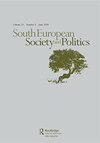民粹主义面临两极分化考验:意大利2019-20年选举周期
IF 4.6
1区 社会学
Q1 POLITICAL SCIENCE
引用次数: 17
摘要
在一个前所未有的政府诞生一年后,其特点是联盟伙伴(五星运动党和联盟党)都采取了强烈的民粹主义立场,在许多政治问题上政党立场日益两极分化的背景下,2019 - 2020年的欧洲和地区选举对意大利来说是一次重要的考验。在介绍了2019 - 2020年选举周期的结果之后,本文研究了政党竞争最突出的路线和不同程度的两极分化。我们的分析显示了两种类型的两极分化:第一种是联合政府内部的两极分化,这是第一届孔蒂政府的特点;而影响整个政党体系的第二点,则是由极右翼政党在选举中的崛起所推动的。本文章由计算机程序翻译,如有差异,请以英文原文为准。
Populism Put to the Polarisation Test: The 2019–20 Election Cycle in Italy
ABSTRACT One year after the birth of an unprecedented government characterised by the strong populist stance of both coalition partners (M5S and the Lega) and amid a growing polarisation in party positions on a number of political issues, the European and regional elections of 2019–20 marked an important test for Italy. After presenting the results of the 2019–20 election cycle, the article investigates the most salient lines of party competition and the varying degrees of polarisation. Our analysis shows two kinds of polarisation: the first being the intra-coalitional polarisation which characterised the first Conte government; while the second, affecting the party system as a whole, is driven by the electoral rise of far-right parties.
求助全文
通过发布文献求助,成功后即可免费获取论文全文。
去求助
来源期刊

South European Society and Politics
Multiple-
CiteScore
5.80
自引率
21.20%
发文量
14
期刊介绍:
A leading point of reference for scholars of Southern Europe, South European Society and Politics promotes both comparative and inter-disciplinary analyses, as well as offering innovative single county and sub-national studies. The journal acts as a forum for social, economic, cultural, contemporary historical and political approaches to research on the region, and is particularly keen to sponsor policy–focused studies in all these disciplines. The journal publishes research articles; South European Atlas with election reports and articles on other subjects of topical interest, and an extensive book reviews section, including both review articles and individual book reviews.
 求助内容:
求助内容: 应助结果提醒方式:
应助结果提醒方式:


